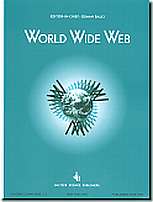
Springer World Wide Web Journal |

|
Special Issue on Web Information Management in the Big Data Era
Not only is data creation by humanity on an unprecedented tear, the rate of doing so is accelerating as well --- so much so that 90% of the data in the world today has been created in the past two years alone. Data comes from every source imaginable: sensors used to gather location information, posts on social media sites, digital pictures and videos, retail records, and tweets to name a few. It certainly is the era of big data. Big data is more than simply a matter of size; it is an opportunity to find insights in new and emerging types of data and content, to make an organization more agile and adaptable, and to answer questions that were previously considered beyond people's reach. It is fundamentally impacting various scientific disciplines as well, e.g. leading to better understanding of climate change (http://climatechange.cs.umn.edu), and revolutionizing the study of social sciences (http://www.vwobservatory.com).
Until now, there were very few practical ways to create this opportunity. Indeed, Web information from the Internet, an ocean of content, swirling with documents, news, blogs, twits, speculation and rumors, is one of the most important parts of big data. Meanwhile, knowledge management consists of a range of strategies and practices to identify, create, represent, distribute, manage, and enable the adoption of insights and experiences. Therefore, there is a crucial need to reinvestigate and re-examine Web information management issues in the big data era. As a result of this data-driven development, Web information management in the big data era becomes a never-ending resilience field and attracts growing research efforts from different areas.
Springer World Wide Web Journal solicits papers presenting original research for a Special Issue titled Web Information Management in the Big Data Era. The goal of this special issue is to bring together current development, ideas, and applications of Web information management, especially as it is being transformed by big data. Manuscripts are solicited to address a wide range of topics in Web information management in the big data era, but not limit to the following:
- Advanced database and Web applications
- Big data management and analysis
- Cloud data mining
- Cloud computing
- Content management
- Data and information quality
- Databases for emerging hardware
- Data management for mobile and pervasive computing
- Deep Web
- Energy efficient computing for big data
- Information extraction
- Information integration and heterogeneous systems
- Linking and graph mining
- Knowledge base systems
- Mobile Internet
- RDF data indexing and storage
- Recommender systems
- Scientific data management and mining
- Semantic Web and ontology
- Security, privacy, and trust
- Social Network Analysis
- Social search
- Data management and mining in social Web
- Filtering techniques (ranking, collaborative filtering, topic detection and tracking, etc) for social Web
- Web advertising and community analysis
- Web-based collaboration
- Web search and meta-search
- Web service and information management
Submission Guidelines
Authors are encouraged to submit high-quality, original work that has neither appeared in, nor is under consideration by, other journals. Springer offers authors, editors and reviewers of World Wide Web Journal a web-enabled online manuscript submission and review system. Our online system offers authors the ability to track the review process of their manuscript. Manuscripts should be submitted to: http://WWWJ.edmgr.com under the article type "Web Information Management". This online system offers easy and straightforward log-in and submission procedures, and supports a wide range of submission file formats.
Important Dates
| Submission Deadline | 10 May 2013 |
| Preliminary Results | 10 August 2013 |
| Revised Version | 10 September 2013 |
| Notification of Acceptance | 10 October 2013 |
| Final Manuscripts Due | 10 November 2013 |
| Anticipated Publication | Late 2013/Early 2014 |
Guest editors
| Hui Xiong | Rutgers University, USA | hxiong@rutgers.edu |
| Jianyong Wang | Tsinghua University, China | jianyong@tsinghua.edu.cn |
| Jaideep Srivastava | University of Minnesota, USA | srivasta@cs.umn.edu |
| Enhong Chen | Univ. of Science and Technology of China, China | cheneh@ustc.edu.cn |